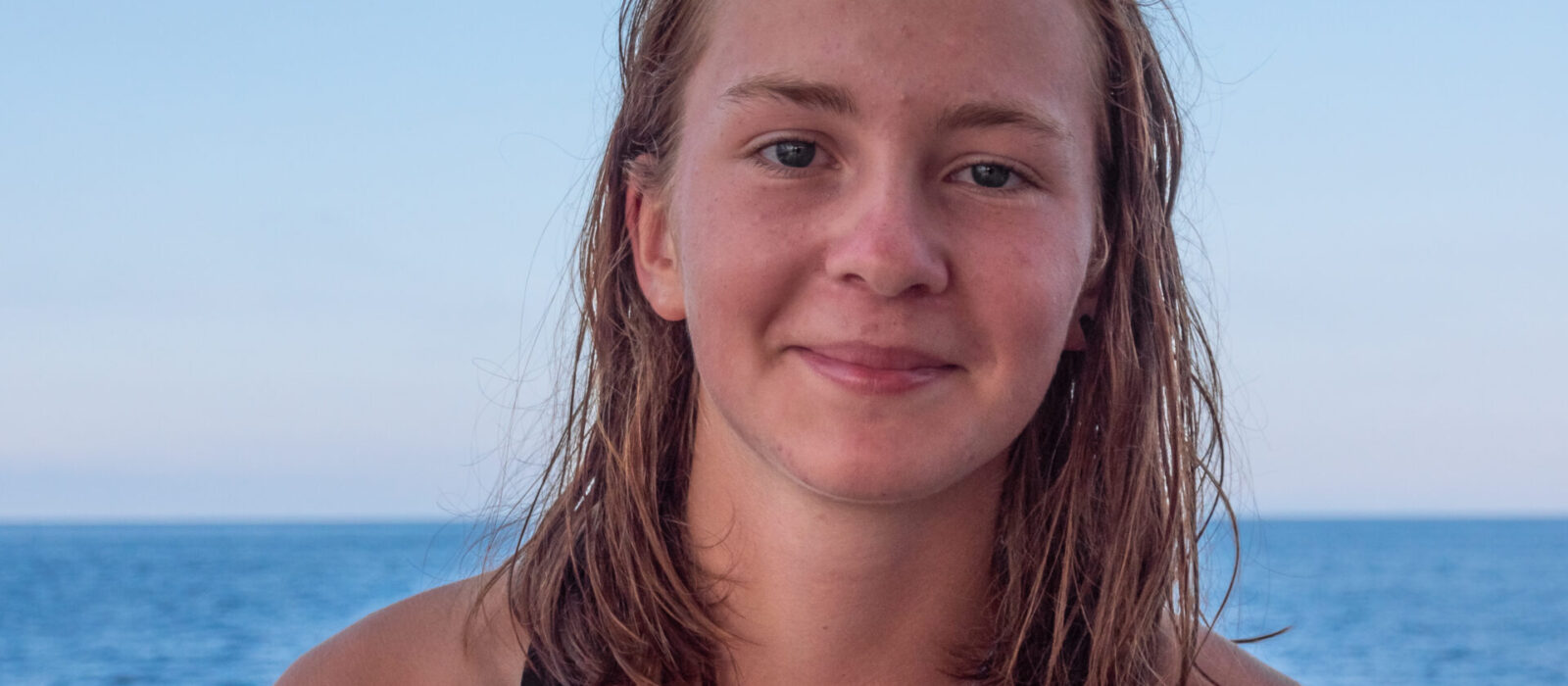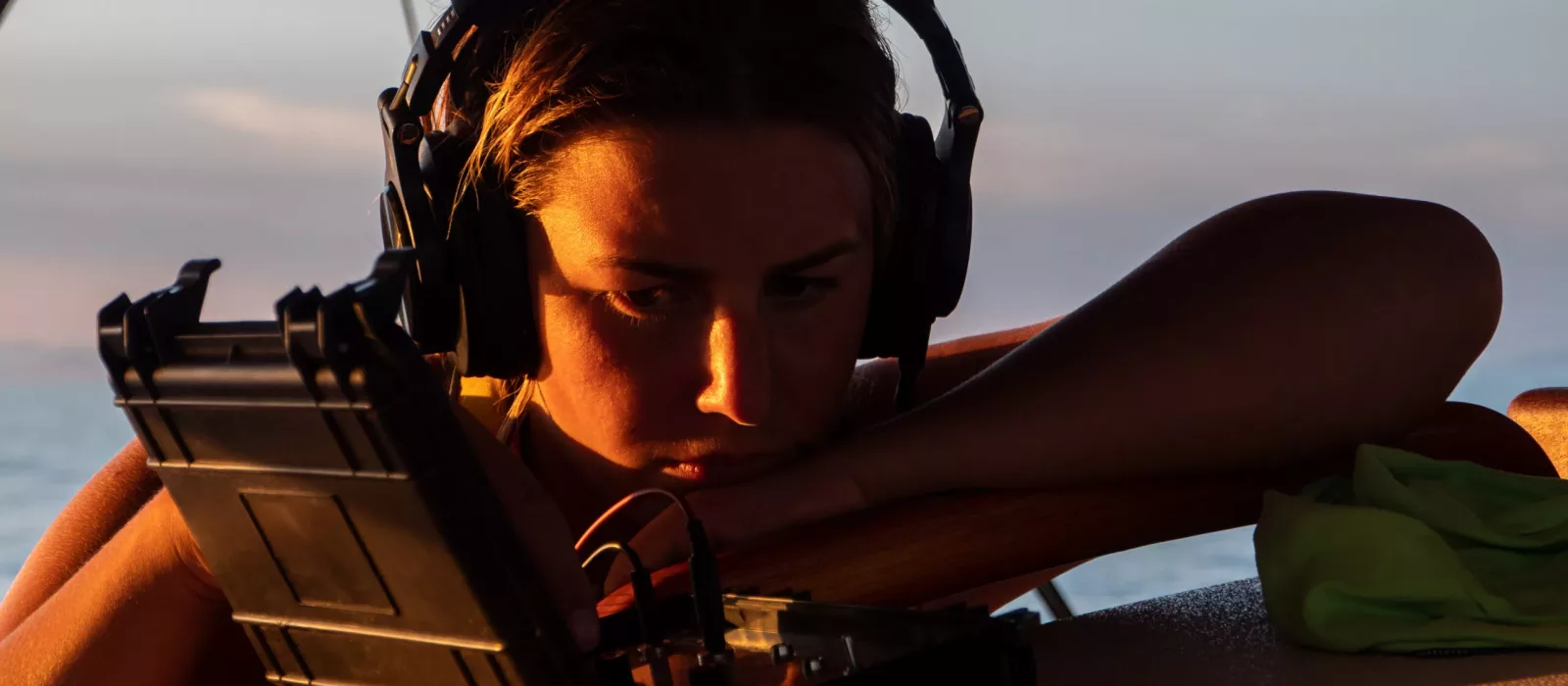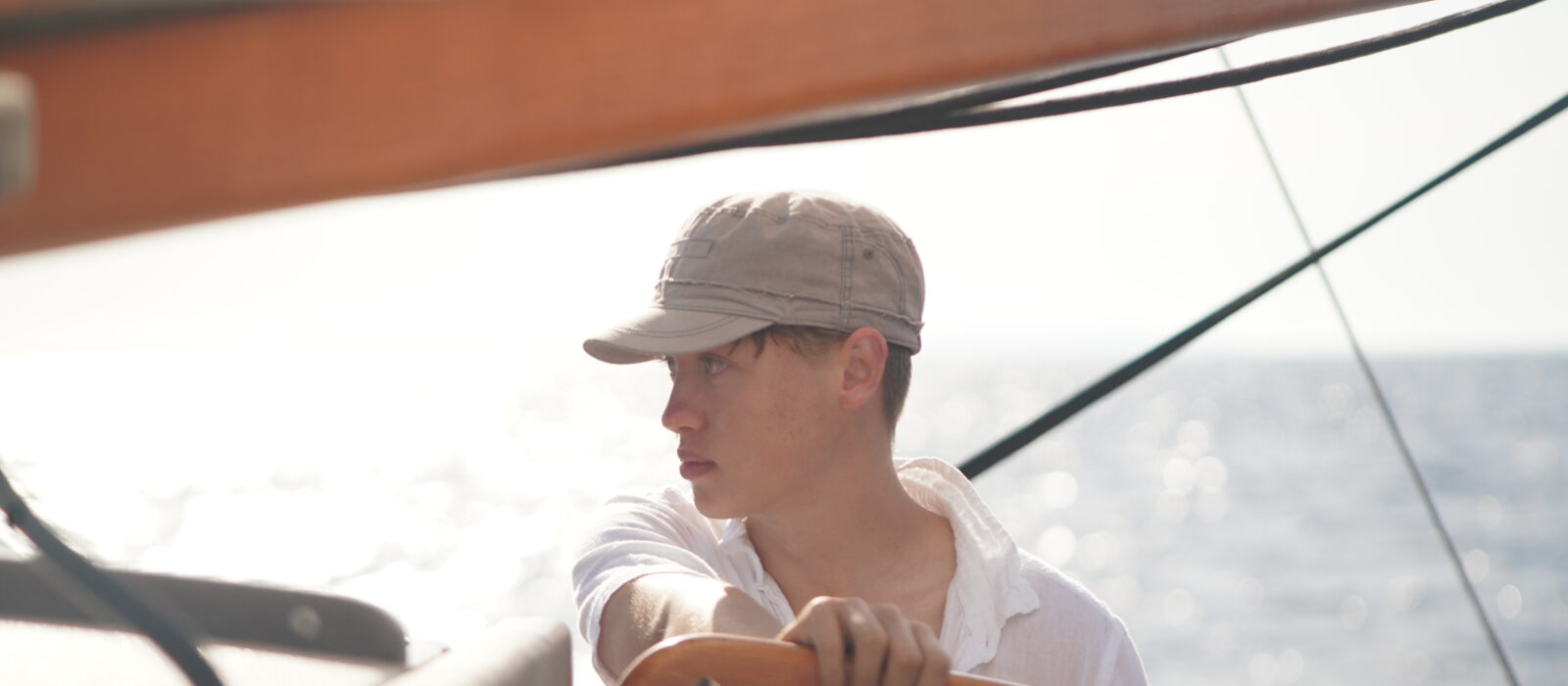A unique opportunity was offered by Okeanos to young committed people when participating in the summer camps of our youth initiative “waves of action” in Southern France where they developed their own environmental project ideas under experienced workshop-leaders and spend an incredible time on the Vaka Okeanos, with magic days and nights surrounded by whales and dolphins in the Mediterranean Sea. Two participants share insights into their eye-opening experiences and why they decided to take action for ocean awareness.
dive right in:
Interview with Tonya
Interview with Paolo
Tonya Avemarg

16 year old student from Kiel, was participant in the waves of action summer camp 2022. She tells us in an interview what she experienced in the workshop on the French Mediterranean coast and on board Vaka Okeanos.
Okeanos:
Hi Tonya. How did you hear about the Okeanos Foundation for the Sea’s waves of action summer camps?
Tonya:
Actually through a friend of my father’s. I saw the announcement and knew, “I have to do that!”
Okeanos:
With what expectations did you participate?
Tonya:
Definitely that the water is warm. I don’t know that because I’ve always been in the Baltic Sea. And that I get to know other sea life. And then, of course, that I’ll make friends and network with other people who are passionate about marine conservation. But I also let myself be surprised.
Okeanos:
The summer camp was divided into two blocks. First a workshop on land, then the stay at the Vaka. How did you feel about that?
Tonya:
I thought the stay on land with the workshop at the beginning was very important, because it gave us a chance to get to know each other as a group and find out what makes us all tick. And sailing on the Vaka was the best team-building activity you can do. To be able to really experience this together, it was good that we first worked on our project developments on land. And it was also good that the workshop was held on land, because there were so many great things happening on the Vaka all the time that we would have been distracted by them. On board, for example, we once had a marine biology talk when a manta ray showed up next to the boat. And everyone had forgotten what we were supposed to be doing. That was totally cool, but the concentrated work on land beforehand was an important foundation.
Okeanos:
Could you imagine beforehand what to expect in the Design Thinking workshop?
Tonya:
First of all, it was a big question mark for me, but then our workshop leader Sascha Wolff gave an introduction in our pre-meeting. Nevertheless, I then imagined that we would spend the whole day standing in front of a whiteboard and creating mind maps, just like at a conference. And then I was totally surprised how free the workshop was. I realized that I could go into the workshop with my own individual experiences and come out with concrete project ideas. In addition, we were all able to slowly familiarize ourselves with the Mediterranean Sea and were able to go swimming and snorkeling. This was a great preparation for the time on the Vaka, because some participants have fears about the sea. They were able to slowly overcome them. Sometimes we even met in the sea to discuss our ideas.
Okeanos:
Can you say something about your project idea?
Tonya:
My approach is that I want to bring people closer to the beauty and significance of the Baltic Sea. I wanted to develop a calendar for this, but I still have to make some progress photographically for that, and the printing costs would also be too high. In the workshop I also realized that it must be something that I can really integrate into my everyday life. The sea is part of my life. I go swimming, think about it a lot, and with my own algae research project, I’m also very close to the sea. Connecting that is my goal. And maybe using social media to do that. I’m not an influencer, but I see myself as an ocean ambassador. But I don’t want to put myself out there personally. Last week, for example, I was at the sea, the cormorants were already flying very low, I noticed the sea grass meadows, it was real autumn atmosphere at the sea. To show that and to inform about how this situation will change if, for example, climate change goes ahead, that’s what I set out to do.
Okeanos:
Could you imagine what a vaka is and what life would be like on it?
Tonya:
Well, I first thought, “Catamaran, mega cool!” I’ve dreamed of sailing on a catamaran my whole life. Sailboat is great too, but catamaran is an extra level of cool, I thought. When I saw catamarans on the fjord, I thought they were so incredibly majestic. The small boats always sailed so hard on the wind and were already almost transverse, and the catamarans passed by feeling effortless. But even if I could not imagine much under a Vaka, the video of the crew helped me by introducing us to the Vaka in advance. But that this Polynesian catamaran is so beautiful, I really could not guess.
Okeanos:
You didn’t know the other participants beforehand, but you knew that you would be living together for a week on the Vaka in a very small space and in a rather unfamiliar living environment. Did that worry you beforehand?
Tonya:
Yes, of course! I think everyone wonders beforehand what will happen if you are not properly integrated into the group. That can happen. But because we have a common goal, marine conservation, I also hoped that we would have no problem getting into conversation.
Okeanos:
And was that the case?
Tonya:
Absolutely! I am so glad that I was traveling with exactly this group! We came from very different regions of Germany, from Berlin to Hamburg and Kiel to the other end of Germany. The fact that we were united by a common theme and shared a common enthusiasm for what we were doing created a great atmosphere and we were all able to really get involved with each other.
Okeanos:
When you switched to the Vaka after the first five days at the land camp, how was this change for you?
Tonya:
I was really looking forward to sleeping under the open sky on deck. You’re in the fresh air all the time, you don’t have walls between you and the sea. Only the seasickness made it a bit difficult for me at the beginning to imagine being on board for a whole week. But that stopped after two days, and then it was just really cool. Life on board is easy, the food is great and so are the sleeping accommodations – so it’s all great!
Okeanos:
What were the highlights on board for you?
Tonya:
The awesome encounters with whales! One morning when the sperm whales were swimming around us, I thought I was in a movie! It was so surreal. These gigantic animals. The encounters with the sea creatures were the highlights. But in terms of the entirety of the stay, it was also living with the others. That’s something that you can’t limit to a specific moment, but that’s what made it special.
Okeanos:
On board was also a student of marine biology, who gave you an understanding of the marine ecosystem.
Tonya:
In the first two days we couldn’t do that much with Xemina because we just weren’t feeling well. But then we got into topics like food webs. We looked at which animals and plants and especially which algae we had seen ourselves when we were snorkeling. Eva drew all this and at the end we put it in relation to each other. Then we looked at the difference between organisms that live on the bottom and those that live in the water column. We also learned a lot about the importance of seaweed, which we were able to explore ourselves here on the coast.
Another cool activity was a role play in which we explored the various interests of stakeholders in relation to the Mediterranean Sea. For example, I was a local spokesperson for the fishing industry. I quickly became aware of the conflict of interests – on the one hand, tourism, and the fishing industry, and on the other, protection of the sea, i.e., ecological aspects. We tried to get closer and listen to each other in our different roles and interest groups, but it was really difficult. Because there is also so much money behind each industry. I realized that the money power that these industries bring is quite hard to counter with ecological arguments. We realized that it’s not all so simple, but that the solutions are complex. Not daunting, but just so complex that complex solutions are required. For example, when it came to preserving jobs, we considered how we could find other ways through contracts. We agreed on pilot projects that could show how ecology could be combined with tourism and fishing. And then we agreed to look closely at the results after these pilot projects: What effect did the changes have on the economy and on the ecology of the Mediterranean?
The whole thing was also totally funny in the meantime. For example, the representatives of the tourism industry called themselves “Saint” and “Tropez”. And because our moderator, another participant of the camp, is also an enthusiastic photographer, he sometimes had to jump up with the camera in between when something was to be seen in the water. By the way, I also learned a lot about fishing methods, some of which are considered sustainable, but are not. We had to swallow hard at some of the figures on fishing, but at the same time we always looked with Xemina: What can we still build on, what can be saved and how?
A highlight was the presentation about whales. For this, everyone climbed a mountain in a bay and Xemina played whale sounds and gave a great presentation. We also worked regularly with the hydrophone and collected samples with the plankton net and looked at them with the microscope.
Okeanos:
You live on the shores of the Baltic Sea and certainly already know more about marine ecosystems than some of the other participants. Was it all just a repetition for you then?
Tonya:
Well, I was familiar with the food web in theory, but it was something completely different to then also make determinations in practice on site. When we went snorkeling, we looked very closely with Xemina at what we saw underwater. And I had never thought about the conflict of interest, which became so clear in the role play, in such depth. But above all, I learned a lot of new things about whales. I didn’t know anything about whales at all.
Okeanos:
What did you gain from your time on board Vaka Okeanos?
Tonya:
A very important realization: ‘People, if we all spread the enthusiasm that we now have, then we can make something really, really big happen!’. A bit like a wave, infecting every single person with our energy and then really tearing something up!
Okeanos:
Then that fits perfectly with the name of our youth initiative, waves of action!
Tonya:
And I think it would be especially cool if Okeanos could reach young people from very different regions of Germany and from very different life situations and backgrounds. Also with the summer camp offers. Anyone and everyone who has the opportunity to develop such enthusiasm for the ocean becomes a multiplier!
Paolo
17 years old, was participant in the first Okeanos ‘waves of action’ summer camp 2022. “A time that changed my perception of the sea radically”, he admits. How that happened and what action Paolo takes for ocean protection since he is back, he told us in an interview:
Okeanos:
Paolo, you live in Darmstadt, several hundreds of kilometers away from the next coastline. Why did you decide to apply for the waves of action summer camp?
Paolo:
Well I guess because I always felt attracted to ocean environments and also knew that oceans play a crucial role in our climate system. A fact that we tend to forget regularly, since we are land based beings and much more connected to forests or terrestrial ecosystems than to oceans. At least where I live.
Second I think that the workshop offered in the first camp matched completely with what I wanted to learn. I have had my head around the question of how to best communicate environmental issues for quite a while.
And last but not least because I really wanted to be on board of a Polynesian Catamaran and experience marine environments as close as possible.
Okeanos:
Looking back, what were the most impressive moments during the workshop phase on land and the time on board Vaka Okeanos?
Paolo:
From the workshop side of things, it was great to get practical training from the first moment on. I was surprised how fast we improved our skills and were able to create first stories. Workshop leader Manolo Ty also arrange for external input on issues like press work which made me understand how to better communicate my own project ideas. We also had a meeting with filmmaker Phillip Grieß from UFA who gave us intriguing insights into his work.
On board of the Vaka, we entered a universe that was new to me. I realized that oceans are not monotonous blue spaces but consist of many different areas and habitats and are ideally full of life. A perception that was strengthened by the regular working sessions we had with the marine biologist that accompanied the trip to give us scientific insights. On our second day, we were surrounded by Finn whales and dolphins at the same time. That was a moment that you cannot plan! And experiences like swimming in the open ocean with no land in sight or moving across the Sea with proper wind in the sails was a completely new experience. By the way one that led me to enroll in a sailing school once I was back home.
Okeanos:
You also made some rather disturbing experiences that led to a project idea amongst the participants. Can you describe what happened?
Paolo:
Vaka Okeanos is equipped with a Hydrophone. We used it regularly to check whale populations around us and to get a feeling for the acoustic sphere under water. From the first day on, we heard awfully high sounds. They slowly started to increase until they reached a climax and decreased again, just to return a few moments later. When I took off the headphones, I still heard that noise. It was especially disturbing in the cabins that are situated in the hulls of the Catamaran. First we thought that this was impossible, then we realized that a noise created under water but so clearly perceived above water must leave an impact on cetaceans that use acoustic signals for their orientation. Interestingly, we did not encounter any Sperm Whales.
Okeanos:
Where did that sound come from?
Paolo:
The French marine was leading some sonar activity in the same area where we were sailing. The perception of the massive noise pollution was so disturbing that the group decided to kick off a project on noise pollution and its influence on cetaceans. Together with our workshop leader Manolo, we are now working on a print documentary and on a traveling exhibition on noise pollution. Our idea is to create a scenario that will allow visitors to understand what it feels like if a whale’s orientation is disturbed by underwater noise. We are now supported by scientists and exhibition curators to create an exhibition experience that can travel to schools for example – very small and easy to transport but allowing you to develop a sense for the impact of noise pollution.
Okeanos:
That is a very ambitious plan.
Paolo:
Yes, but since I returned from Vaka Okeanos I also made an internship at the Okeanos head office in Darmstadt/Germany, and we created a network that will support us. For example, did we connect to the next waves of action group that is currently sailing on Vaka Okeanos. We asked them if they would note down acoustic signals they receive with the hydrophone as well as sightings of cetaceans. And the crew on board is supporting our data collection effort, too.
Okeanos:
Good luck with your projects and thanks for your insights!

